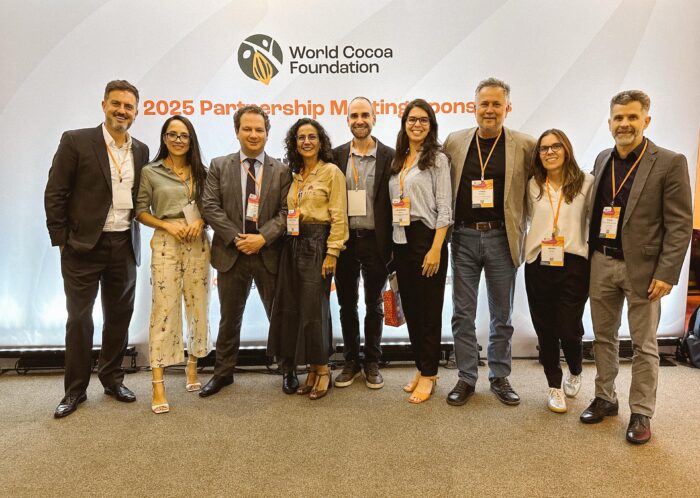
Brazil has gained a new financing fund focused on family and regenerative agriculture: Kawá, an initiative of Instituto Arapyaú, Violet, Tabôa Fortalecimento Comunitário, and MOV Investimentos, which aims to reach R$1 billion by 2030. The goal is to value small cocoa producers, increase productivity, and encourage forest conservation. In the first phase, Kawá will benefit 1200 cocoa farmers who adopt agroforestry cultivation in southern Bahia and Pará with R$30 million.
Kawá, whose name refers to kakawa, a word used by pre-Columbian civilizations to refer to the fruit, was announced on March 21 during the Partnership Meeting, an event of the World Cocoa Foundation (WCF) that brought together leaders and major players in the market in São Paulo.
“With this product, we aim to facilitate access to credit and technical assistance for cocoa producers who are outside the financial system,” says Vinicius Ahmar, bioeconomy manager at Arapyaú.
Built on the blended finance model, which includes resources from market investors, concessional capital, and philanthropic organizations, Kawá enters the market as a Fiagro (Investment Fund in Agroindustrial Production Chains). Its credit granting methodology combined with technical assistance was developed and implemented by Tabôa starting in 2017.
Technical support in the field contributes to the success of credit application, especially in the case of agroforestry producers. “This is how, in addition to encouraging environmentally positive agricultural practices, the fund also contributes to the socio-economic development of farming families,” says Roberto Vilela, executive director of Tabôa.
Upon receiving the credit, the producer has up to 45 days to make the investment. After this period, there are 36 months to repay it, with an average grace period of six months. The interest rates are 12% per year. The funds are mainly used for fertilization, irrigation, labor, equipment purchase, and densification with seedlings.
The project has the partnership of VERT, which will be the fund administrator, and the National Association of Cocoa Processing Industries (AIPC), with the indication of purchasing cocoa from the benefiting producers. The initiative also includes an Enabling Conditions Facility (ECF) for technical assistance financing coordinated by Violet, which also contributes with its proprietary technological platform for monitoring and transparency in fund management, ensuring a scalable, secure, and efficient operation.
Technical assistance will be provided by the Solidaridad Foundation, Ciapra (Intermunicipal Consortium of the Mosaic of the Apas of the Lower South of Bahia), and Polímatas Agricultural and Environmental Solutions, the latter with funding provided by Suzano. Credit origination will be led by Tabôa, which will also provide technical assistance in Bahia. Kawá also includes ReSeed, which will be responsible for the carbon credits generated on the beneficiaries’ properties.
In addition to its robustness and ambitious goals, which give it an unprecedented character, Kawá has an innovative proposal by including a technological platform for monitoring farmer data, ensuring not only operational efficiency but also the initiative’s scale. “Kawá was designed to be a scalable business. This technological monitoring makes investors feel more secure and interested in financing small sustainable producers,” explains Martha de Sá, founder of Violet.
Vinicius Ahmar highlights that this information line may unlock, in the future, more than just credit with technical assistance. The expectation is that the fund’s operational history will influence the adoption of similar models in other chains and even the creation of public policies for family farming, with the potential to impact many more producers.
Sustainable CRA enters a new phase and raises R$23.6 million
Before the creation of the Kawá Fund, the blended finance methodology – a model that combines different sources of resources – had already proven successful in issuing Agricultural Receivables Certificates (CRA) for sustainable cocoa production. Between 2020 and 2023, Sustainable CRA positively impacted over 270 families in 11 municipalities in southern Bahia, with significant results: an average income increase of 60% for producers, a default rate of only 0.28%, and an impressive 52% growth in cocoa productivity.
The model operates with solidary guarantee, where groups of 3 to 10 farmers become mutual guarantors. This approach, implemented by Tabôa, has facilitated access to credit for family farmers, strengthening productive chains in an inclusive manner.
In a more recent stage, the Sustainable CRA project for Cocoa expanded its reach to 25 municipalities in the Atlantic Forest and the Amazon. With a planned duration of five years, the new operation raised R$23.6 million: R$10.3 million through CRAs and R$13.3 million through other sources, both from resources from market investors, philanthropic institutions, and impact organizations, such as the Arapyaú, humanize, and Itaúsa institutes, Solidaridad Foundation, Rabo Foundation (linked to Rabobank), and BNDES – the latter with an investment of R$4 million.